This is a pretty random selection from my shelves - enjoy!
First off is Pat Barker's World
War I trilogy: Regeneration, The Eye
in the Door, and The Ghost Road. Although The Ghost Road won
the 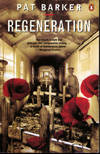 Booker
Prize, in my opinion Regeneration (now a film)
is the strongest book of the three and top contender for Best Book I
Booker
Prize, in my opinion Regeneration (now a film)
is the strongest book of the three and top contender for Best Book I 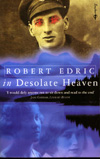 Have
Ever Read In My Life Ever 8). I ca'n't even begin to describe the spell
this strange, haunted, compassionate book wove over me. The first time
I read it was in the small hours, with rain pounding on the roof above
me and the wind screaming around the house, and at first I put the book's
haunting, compelling quality down to pathetic fallacy. But each time I
have read it since I have fallen under its spell all over again. Focussing
on Army psychiatrist Dr WHR Rivers and his patients at Craiglockhart shellshock
hospital, Siegfried Sassoon, Wilfred Owen, and the fictional Billy Prior,
it is as powerful an anti-war statement as anything I have read. The Eye
in the Door and The Ghost Road continue the characters' tragic stories
up to the end of the war. The trilogy is a remarkable literary achievement:
do not miss. (If you liked this, by the way, you will probably also like
In Desolate Heaven, by Robert Edric - an utterly glacial
novel, set in a Swiss spa town after the war, about the psychological
wounds it inflicted. A difficult book, but ultimately worth the time you
have to put into it.)
Have
Ever Read In My Life Ever 8). I ca'n't even begin to describe the spell
this strange, haunted, compassionate book wove over me. The first time
I read it was in the small hours, with rain pounding on the roof above
me and the wind screaming around the house, and at first I put the book's
haunting, compelling quality down to pathetic fallacy. But each time I
have read it since I have fallen under its spell all over again. Focussing
on Army psychiatrist Dr WHR Rivers and his patients at Craiglockhart shellshock
hospital, Siegfried Sassoon, Wilfred Owen, and the fictional Billy Prior,
it is as powerful an anti-war statement as anything I have read. The Eye
in the Door and The Ghost Road continue the characters' tragic stories
up to the end of the war. The trilogy is a remarkable literary achievement:
do not miss. (If you liked this, by the way, you will probably also like
In Desolate Heaven, by Robert Edric - an utterly glacial
novel, set in a Swiss spa town after the war, about the psychological
wounds it inflicted. A difficult book, but ultimately worth the time you
have to put into it.)
The Gormenghast Trilogy by Mervyn
Peake. Comprising Titus Groan, Gormenghast, and Titus Alone,
this is one of the most remarkable pieces of writing I've ever read. I've
never come across anything quite like it and I'm pretty sure I never will.
Set in the massive 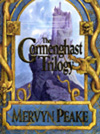 Gormenghast
Castle, a place bringing a new meaning to obsessive-compulsive disorder
- everything in the castle is ruled by ritual, and the real power figure
is the Master of Ritual, who runs the lives of the Earl and his family
- the trilogy concerns the life of the 77th Earl, Titus Groan, who has
just been born at the beginning of the first book and has grown to manhood
by the end of the third. Titus is a rebel, feeling trapped by his
Gormenghast
Castle, a place bringing a new meaning to obsessive-compulsive disorder
- everything in the castle is ruled by ritual, and the real power figure
is the Master of Ritual, who runs the lives of the Earl and his family
- the trilogy concerns the life of the 77th Earl, Titus Groan, who has
just been born at the beginning of the first book and has grown to manhood
by the end of the third. Titus is a rebel, feeling trapped by his  heritage
and the ritual of castle life, and the story of his awakening and rebellion
is fascinating. The books are thronged with a horde of bizarre, freakish,
and mesmerizing characters - the dismal 76th Earl, ill-fated Sepulchrave;
his wife, the Countess of Groan, a massive woman whose life is wrapped
up in her beloved cats and birds and who remembers her children about
once a year; and Fuchsia, Titus' sister, a strange, wild girl, with ferocious
and heartfelt likes and dislikes. Outside the Family there is Dr Prunesquallor
- highly intelligent but slightly mad, with a laugh whose pitch "scrapes
at the inner wall of the skull"; Steerpike, the evil, power-mad youth
who escapes from the kitchens to begin his Machiavellian machinations
among the Family; and Mr Flay, Sepulchrave's manservant, spidery, hard,
but absolutely loyal. These characters go their ways in the strange, melancholy,
black-washed atmosphere of the castle, brilliantly evoked by Peake in
his unusual, wholly original prose. His descriptions are immediate and
striking: for example, a character's "crockery laughter rattle[s]
down the hill in broken pieces". The books are quite difficult -
particularly the third book (written when Peake had already begun to suffer
from mental illness) which is very disconnected - but the prose is worth
any amount of invested time. A truly unique talent.
heritage
and the ritual of castle life, and the story of his awakening and rebellion
is fascinating. The books are thronged with a horde of bizarre, freakish,
and mesmerizing characters - the dismal 76th Earl, ill-fated Sepulchrave;
his wife, the Countess of Groan, a massive woman whose life is wrapped
up in her beloved cats and birds and who remembers her children about
once a year; and Fuchsia, Titus' sister, a strange, wild girl, with ferocious
and heartfelt likes and dislikes. Outside the Family there is Dr Prunesquallor
- highly intelligent but slightly mad, with a laugh whose pitch "scrapes
at the inner wall of the skull"; Steerpike, the evil, power-mad youth
who escapes from the kitchens to begin his Machiavellian machinations
among the Family; and Mr Flay, Sepulchrave's manservant, spidery, hard,
but absolutely loyal. These characters go their ways in the strange, melancholy,
black-washed atmosphere of the castle, brilliantly evoked by Peake in
his unusual, wholly original prose. His descriptions are immediate and
striking: for example, a character's "crockery laughter rattle[s]
down the hill in broken pieces". The books are quite difficult -
particularly the third book (written when Peake had already begun to suffer
from mental illness) which is very disconnected - but the prose is worth
any amount of invested time. A truly unique talent.
Speaking - or writing - of difficult books, it's a nice transition to The Crying of Lot 49 by Thomas Pynchon. Looking for something thin to read one weekend, I saw the *very* thin Lot 49 on the shelf and vaguely remembered Pynchon being one of those authors everyone is supposed to have read. So out of curiosity I picked it up. The prose is very dense and hard to read, sentences regularly running to over half a page, but it's worth it all because the book has a great imaginative story. The drive to find out what the mysterious Trystero and WASTE are will sustain you through the longest of sentences, and the suspense is brilliantly maintained throughout. And the prose isn't all that bad - there is a chapter-long summary of a Webster-like 16. century play which is a delight - all sorts of intrigue and mystery and bizarrely inventive deaths are conjured up, although there is room for "a refreshingly simple mass stabbing". Well worth the effort involved - although you may find the ending a little infuriating, I did 8)
Robertson Davies - a fine Canadian
author, and a man who genuinely loved reading - his book, A Voice from
the Attic, is a sort of paean to th e
joys of reading, written in his robust and down-to-earth prose ("a
pox, yea, a gleety imposthume upon [them]" being one of my favourite
exa
e
joys of reading, written in his robust and down-to-earth prose ("a
pox, yea, a gleety imposthume upon [them]" being one of my favourite
exa mples
8)). I was introduced to his books by a nice old lady in a Dublin bookshop
- we both reached simultaneously for the same Mary
Renault book (Fire from Heaven, if you must know) and fell
into conversation. She told me if I liked Mary Renault I would very much
like Davies; I'd already spent that week's book allowance on Rian Malan's
My Traitor's Heart but a few weeks later I bought the Cornish trilogy,
the first of many Davies books that have ended up on my shelves. I often
wish I could run into her again and thank her for the hours I have happily
whiled away reading these. All his books are superb - erudite, literary,
his characters have brains and they're not embarrassed to admit the fact.
Davies was very widely-read and his breadth of learning shines through
every book, which glitter with wit and wisdom (this is beginning to sound
like back-cover blurb). My favourite is still the Cornish trilogy, particularly
the middle book, What's Bred in the Bone, which picks apart a man's
life and character, building him into someone as real as you will ever
find between the pages of a book. Superb stuff.
mples
8)). I was introduced to his books by a nice old lady in a Dublin bookshop
- we both reached simultaneously for the same Mary
Renault book (Fire from Heaven, if you must know) and fell
into conversation. She told me if I liked Mary Renault I would very much
like Davies; I'd already spent that week's book allowance on Rian Malan's
My Traitor's Heart but a few weeks later I bought the Cornish trilogy,
the first of many Davies books that have ended up on my shelves. I often
wish I could run into her again and thank her for the hours I have happily
whiled away reading these. All his books are superb - erudite, literary,
his characters have brains and they're not embarrassed to admit the fact.
Davies was very widely-read and his breadth of learning shines through
every book, which glitter with wit and wisdom (this is beginning to sound
like back-cover blurb). My favourite is still the Cornish trilogy, particularly
the middle book, What's Bred in the Bone, which picks apart a man's
life and character, building him into someone as real as you will ever
find between the pages of a book. Superb stuff.
Who doesn't love Scott Fitzgerald? Even though his books are so firmly rooted in a particular era, they have never dated, dealing as they do with universal themes of human loss and unhappiness, wants and desires. Equally talented in novel and short story formats, the picture he paints of what life was like in the Jazz Age is fascinating. Heartbreaking stories of the ruin and destruction of good people, it's impossible not to get involved in the lives of Anthony and Julia, Nicole and Dick Diver, and of course, Jay Gatsby. Each time I reread The Great Gatsby, I find something new, some new insight into the human condition, and of course, there's that wonderful last line: "And so we beat on, boats against the current, borne back ceaselessly into the past."
David Malouf is a terrific Australian writer who has a striking way with language and a real talent for description - for example, in Remembering Babylon, his study of tensions between white and black in Australia, a wheat field in the sun "burn[s] with a flaminess that boomed and shook out flares". It's an unusual description but one that has a visceral, instinctive rightness. His Conversations at Curlow Creek opens with a great image of a dark, smelly, stifling cabin; a man stands in the doorway and his shadow is thrown along the floor and up the opposite wall by the moonlight. It's described in a few short lines but the scene is so vivid and filled with anticipation and tension you feel like you're in the cabin, trapped with its unfortunate occupant. He draws real, memorable characters (both Adair and the prisoner in Curlow Creek will imprint themselves on your memory, as will his portrayal of Ovid in An Imaginary Life.) And he has a gift for capturing the brief moments of intimacy in relationships - there's a lovely scene in Remembering Babylon where a woman is describing how a circus came to her town when she was a child, with a tightrope walker, and how her father brought her down to see it. As she talks she is imitating the tightrope walker's act, arms outstretched, and her husband stares at her, saying: "I'd ha' gi'en anything to ha' seen it. To ha' seen thee, I mean." It's one of the most touching and genuine moments in the book (in my humble O, of course 8)). My only problem with Malouf is that he has a tendency to go a bit mystic and arty in his endings (Harland's Half Acre jumps to mind), but the quality of the writing everywhere else makes it worth cutting him a bit of slack 8).
Mary Renault has written a very good trilogy about Alexander the Great: Fire from Heaven, The Persian Boy, and Funeral Games, which trace Alexander from his childhood to the break-up of his huge empire after his untimely death. His is a fascinating life - even now it is staggering to look at the size of his empire on a map, stretching from Greece to India, and to think that he achieved this in his twenties (he died at 32), over 2000 years ago, makes you appreciate the extraordinary qualities he had. I have read many biographies of this remarkable leader, but Renault's books bring him vividly to life, and get under the skin of Alexander the man as opposed to Alexander the historical figure. Her other historical books, such as The Lion in the Gateway, are also good; her other novels, such as Purposes of Love and The Charioteer, are extremely dated.
I can lump my next three choices under
the heading of "dashed British, old chap" - Rider Haggard, Rudyard
Kipling, and John Buchan. Rider Haggard's books include King
Solomon's Mines, its sequel Allan Quatermain, and She,
all of which are ripping yarns 8), traditional adventure stories w ith
classic British heroes - and I'm not ashamed to say I cried at the end
of Allan Quatermain 8).
ith
classic British heroes - and I'm not ashamed to say I cried at the end
of Allan Quatermain 8).
Kipling I think has come in for a lot of undeserved criticism. Yes, his books are colonial and racist. Of course they are, they're a product of his society and his time. If you accept that and ignore it they are terrific. The Just-So Stories are lovely, and Stalky & Co is a lot of fun, in the tradition of school stories. His short stories are fascinating glimpses of a vanished society, and he was superb at handling complicated themes and clever plots in the short format. Baa Baa Black Sheep in particular is a moving story of his own utterly miserable childhood; They is an unforgettable, eerie story about the death of a child (Kipling's beloved son John was killed in the trenches in the First World War). Kim is an excellent novel - interesting, believable characters, a story filled with loyalty and courage, and Kipling's wonderful gift for description. I've never been to India but reading Kipling you can feel the hot, spicy wind on your face, the copper land and the turquoise sky he describes so lovingly.
John Buchan, of course, is well known for
his adventure yarns, including The Thirty-Nine Steps (worth reading,
as the Robert Donat and Robert Powell movies present completely butchered
versions of the story) and the set of Hannay books which follow it. However,
I prefer 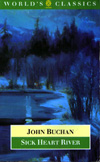 the
books featuring Sir Edward Leithen, Border Scot, lawyer, and sportsman,
a man very close in character to Buchan himself. The books with Leithen
tend to have a more cerebral or spiritual cast - they are idea-driven
rather than straight action. John Macnab is a joie de vivre-saturated
romp in the Scottish hills as Leithen and two friends attempt to carry
out three poaching challenges; The Gap in the Curtain is about
prevision; The Dancing Floor is a very strange book about two characters
trapped in playing out an ancient pagan rite; but my favourite Leithen
book is the last, Sick Heart River. The first time I read it I
wasn't very impressed, but possibly that was because I read it on a plane
and only 10% of my brain was on the book; the other 90% was watching the
wings for signs of dropping off and listening for changes in the engine
note. I have reread it several times since and like it more and more with
each reading, so that by now it would probably be on my desert island
list. The book was written in Buchan's last year when he was very ill,
and it is impossible not to read it as his own story as much as Leithen's.
Leithen, dying of TB, is told he could live many years more if he chooses
to live the easy life and take care of himself. Characteristically, he
decides to "die on his feet" and spend the last of his strength on a hunt
in the far north of Canada for a missing financier, Francis Galliard,
who has disappeared on a hunt for the mysterious Sick Heart River. A book
about isolation, sacrifice, loyalty, friendship, and above all courage,
it is humane, compassionate, and very moving.
the
books featuring Sir Edward Leithen, Border Scot, lawyer, and sportsman,
a man very close in character to Buchan himself. The books with Leithen
tend to have a more cerebral or spiritual cast - they are idea-driven
rather than straight action. John Macnab is a joie de vivre-saturated
romp in the Scottish hills as Leithen and two friends attempt to carry
out three poaching challenges; The Gap in the Curtain is about
prevision; The Dancing Floor is a very strange book about two characters
trapped in playing out an ancient pagan rite; but my favourite Leithen
book is the last, Sick Heart River. The first time I read it I
wasn't very impressed, but possibly that was because I read it on a plane
and only 10% of my brain was on the book; the other 90% was watching the
wings for signs of dropping off and listening for changes in the engine
note. I have reread it several times since and like it more and more with
each reading, so that by now it would probably be on my desert island
list. The book was written in Buchan's last year when he was very ill,
and it is impossible not to read it as his own story as much as Leithen's.
Leithen, dying of TB, is told he could live many years more if he chooses
to live the easy life and take care of himself. Characteristically, he
decides to "die on his feet" and spend the last of his strength on a hunt
in the far north of Canada for a missing financier, Francis Galliard,
who has disappeared on a hunt for the mysterious Sick Heart River. A book
about isolation, sacrifice, loyalty, friendship, and above all courage,
it is humane, compassionate, and very moving. 
This one is a change - the Griffin and Sabine trilogy by Nick Bantock. Griffin Moss, a London artist, one day receives a postcard from a girl called Sabine, living on a tropical island, who appears to be able to see what he draws as though seeing through his own eyes. The three books, Griffin and Sabine, Sabine's Notebook, and The Golden Mean, chronicle their efforts to understand their strange bond and to meet. A strange, fascinating story, it is also a visual feast, as the author, an artist and illustrator, has actually drawn postcards and written out the correspondence through which the story is told. You take actual letters out of envelopes and read them, put them back and read the postcard on the next page in Sabine's flowing handwriting, then the answer in Griffin's angular capitals: it's like reading someone's mail. Bantock is an inventive, imaginative artist, and the postcards and letters are beautiful to look at.
A single book next - Catherine Fox's Angels and Men. Mara is a postgraduate student in a northern English university. Daughter of a clergyman, Mara has a lot of problems. Her sister, member of a cult, has recently drowned herself after bearing a deformed child fathered by the cult leader; Mara herself attempted suicide as a teenager, which neither her nor her family have been able to deal with; and her spiny, prickly personality is not going to help her in making friends at her new college. To make matters worse, she is living next to "the polecat", the rudest, most obnoxious student in the college. The story of Mara's redemption, which could have been saccharine-sweet, is made funny, touching, and very sharp. Mara is a great character - she sees the world in captions, with a bitter, acerbic, amusing weltanschauung, and even at her most prickly and irritating you cannot help but like her. The other characters in the book are similarly well-portrayed and interesting: self-centred as Mara is, even she has to learn that other people have their own problems. Her relationship with her family is beautifully portrayed, with all the awkwardness and embarrassment of stifled affection. And I defy anyone not to fall for the polecat 8)
My friend Mike
introduced me to The Killer Angels by Michael Shaara - thanks
so much, Mike! This Pulitzer Prize-winning 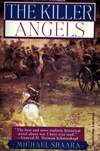 book
recreates the Battle of Gettysburg, turning-point in the American Civil
War. Shaara picks out the main players on both sides and tells the story
in their voices, alternating points of view as the battle progresses till
you are wholly sucked in, identifying with the men on both sides who were
dragged into this conflict without realizing it until it was too late.
Because you get so involved, it becomes harder and harder to read on,
through the litany of errors and mistakes of judgment that you know is
going to lead the men to their doom in Pickett's Charge - don't be surprised
if you end up yelling at some of the characters! Shaara is a wonderful
writer, with a knack for getting under the skin of his characters until
you feel you actually know these people: his imaginings of them are sharp
and wholly convincing, and he has a feel for the little details that make
his world real. His son Jeff wrote a prequel and sequel to The Killer
Angels after his father's death, Gods and Generals and The
Last Full Measure: he's nothing like the writer his father was, but
the books complete the story and are well worth reading.
book
recreates the Battle of Gettysburg, turning-point in the American Civil
War. Shaara picks out the main players on both sides and tells the story
in their voices, alternating points of view as the battle progresses till
you are wholly sucked in, identifying with the men on both sides who were
dragged into this conflict without realizing it until it was too late.
Because you get so involved, it becomes harder and harder to read on,
through the litany of errors and mistakes of judgment that you know is
going to lead the men to their doom in Pickett's Charge - don't be surprised
if you end up yelling at some of the characters! Shaara is a wonderful
writer, with a knack for getting under the skin of his characters until
you feel you actually know these people: his imaginings of them are sharp
and wholly convincing, and he has a feel for the little details that make
his world real. His son Jeff wrote a prequel and sequel to The Killer
Angels after his father's death, Gods and Generals and The
Last Full Measure: he's nothing like the writer his father was, but
the books complete the story and are well worth reading.
